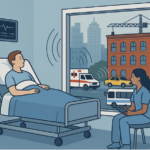By Michael Lentin
Noise is defined as “unwanted or disturbing sound”. What you may not realize is that excessive unwanted sound actually qualifies as pollution. Noise pollution is defined as environmental noise that is annoying, distracting, or physically harmful. Depending on where you live, noise pollution can be an ongoing struggle.

For example, in a large metropolis like New York City, public transportation produces a near-constant stream of sound. NYC is home to the country’s largest subway system, which is more than 100 years old and therefore designed prior to the age of noise-control technology. Noise is consistently the greatest negative influence on the quality of life for residents of the Big Apple; in fact, local authorities received more than 40,000 noise complaints in 2012. Despite the existence of noise codes and associated fines, some cities really never sleep and therefore the noise never stops.
Unlike our eyes, our ears cannot be turned off; noise affects us at all times regardless if we are conscious of it. Even if you live in a rural area, chances are you’ve been woken up by a car horn or siren at some point in your life, or distracted by chatter while you’re trying to study. Though you may be able to quickly fall back asleep or regain concentration, you have been affected. There are varying degrees with which sound can impact your daily life, and the effects can range from mild to severe.
Noise pollution not only can contribute to hearing loss, but it can cause serious sleep disturbances and, over time, lead to non-auditory issues like insomnia, mood disorders, hypertension, and even heart disease. Nowadays, noise pollution is such an issue that there is even an online community solely focused on this topic.
So, what can you do to control the effect of noise pollution in your life? It’s unlikely that urban noise patterns will decrease in the near future, so if moving to a quieter area is not an option for you, the only solution is to modify your existing environment.
A reliable and effective way to reduce noise pollution is to upgrade your Windows. Surprised? The majority of noise pollution comes from outside your home, and your Windows are the easiest entry point. Products like CitiQuiet’s Soundproofing Windows are specifically designed to reduce and remove unwanted sound. Soundproofing Windows produce such an effective sound barrier that they eliminate up to 95% of existing noise. They are also energy-efficient, so they provide the added bonus of moisture and temperature control, with a 99% reduction in drafts.
Because they are installed into the existing Window opening of the interior of your home, with no need for alteration or construction, noise reduction windows require no approval from building management and even add market value to your home. They are fully operable and can be used with your current blinds, curtains, and/or air-conditioning units. These Soundproofing Windows are actually installed a few inches from the existing Window, creating a highly effective barrier that isolates external sound vibrations.

CitiQuiet Windows are the most widely-known Soundproof Windows in the industry. Their products are created according to superior standards, and each Window comes with a 100% satisfaction guarantee. With your physical and mental health on the line, now is the time to take a stand against noise pollution. Contact CitiQuiet, the brand leader in the Soundproof Window market, for a free estimate today. Your ears will thank you!





